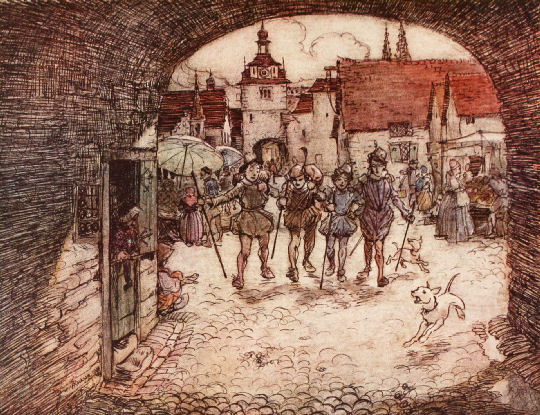
Today’s story from the Brothers Grimm is a little different from the others we’ve looked at lately. “The Four Skilful Brothers” is about going out in to the world to seek your fortune. Have you noticed that sons do this way more often than daughters? The brothers are also labeled “clever” or “artful.”
A poor man has four sons and, when they are grown, he sends them out into the world to learn trades as he has nothing to give them. So the four head out, splitting up when they come to a crossroads. They agree to meet back at the crossroads in four years. Each of the brothers meets a man who teaches him his trade. The eldest becomes an honest thief who steals only what no one else can get ahold of and is never caught. The second becomes an astronomer and receives a gift, a telescope through which he can see anything that happens on earth or in the heavens. The third becomes a skilled huntsman and is given a gun that is sure to hit whatever he aims at. The youngest becomes a tailor. His gift is a needle that will sew anything together. Did you notice that even though there were four brothers, there were only three gifts? That magic number again.
After four years, the brothers come back together as planned. They return home and tell their father about all that happened and about their new skills. The father decides to test them, with a ridiculous test. He asked his second son how many eggs there were in a nest high in a tree, and the second used his telescope to tell him five. Then the eldest went up and stole them without the bird being aware. The father then set the eggs at the four corners of a table and one in the middle and the third son shot all of them through the middle with one shot. The fourth sewed both the chicks and the eggs back up, so that when the eldest put them back without the mother bird’s noticing, they hatched, the only sign being some red thread about their necks. Granted, it showed off the sons’ skills and gifts but it was essentially a useless task.
Not long after, the king’s daughter was stolen by a dragon and he promises her hand in marriage to whoever saves her. The brothers set out to rescue her. The astronomer used his telescope to find her and asked for a ship to reach where she was being held captive on a rock in the sea. The huntsman did not dare shoot the dragon for fear of killing her as well. The thief, however, stole her, and they set out back to the king. The dragon followed, and the huntsman killed him, but when the dragon fell into the ocean, the resulting wave swamped the boat. The tailor, of course, sewed it back together again and they got home safely.
When the brothers took the princess back to the king, the king did not know which man to give his daughter to. All four argued that their part had been indispensable. The king decided to give each of them half a kingdom instead and the brothers agreed that was better than their quarreling. As one version says, the four brothers “lived very happily the rest of their days, and took good care of their father; and somebody took better care of the young lady, than to let either the dragon or one of the craftsmen have her again.”
I like that ending. Most versions forget about the poor princess altogether, even after her harrowing experience. Of course, it does imply that craftsmen are beneath her, that she deserves to marry a prince or king.
Which of the four trades most appeals to you? I can see good points to all of them. The thief is the most romantic even though he doesn’t receive a gift, presumably because he could just steal what he wanted, but the astronomer is the only one who chooses a non-physical skill. The tailor and huntsmen are both useful, especially in the time these tales were first told.
Thursday’s Tales is a weekly event here at Carol’s Notebook. Fairy tales, folktales, tall tales, even re-tellings, I love them all.

That kingdom is so gonna have wars between them in a generation or two
Probably true enough.
You know, I’ve been thinking on tales a lot lately. And I’m glad you do these. 🙂 Thank you.
I admit I haven’t come across this one before. I wonder how soon the lads will work out that there are only two halves to anything? 🙂 You do make a good point about three, though. Usually three sons or daughters, two of them selfish and the youngest gets the prize, whatever it is.
I think the King must have ruled several smaller kingdoms. One version says portions of a kingdom or someting to that effect, it doesn’t specify halves like most do.